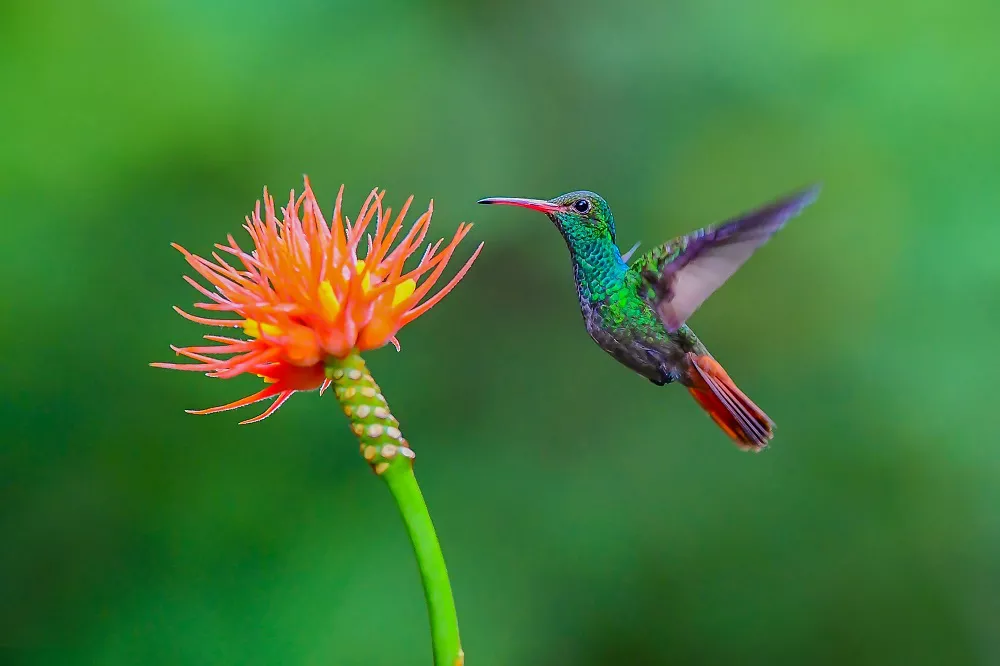Hummingbirds are one of the most fascinating birds that exist on our planet. Known for their small size and incredible speed, these birds are admired by bird watchers and nature lovers all over the world. One question that often arises among people who love these little birds is, “how long do hummingbirds live?”
The lifespan of hummingbirds is a subject of great interest and curiosity for bird enthusiasts. The answer to this question, however, is not very straightforward. There are over 300 different species of hummingbirds, and their lifespan can vary greatly depending on the species.
Average lifespan of a hummingbird:
On average, hummingbirds have a lifespan of about 3-5 years. However, some species can live up to 10 years or more in the wild. The exact lifespan of a hummingbird depends on various factors, including habitat, climate, food availability, predation, and disease.
Shorter-lived Species:
The smallest hummingbird species, the Bee hummingbird, has a lifespan of about 2-3 years, while the largest species, the Giant hummingbird, can live up to 10 years. The Ruby-throated hummingbird, one of the most common hummingbird species in North America, has an average lifespan of about 3-4 years in the wild.
Longer-lived Species:
On the other end of the spectrum, some hummingbird species exhibit remarkable longevity. The Rufous Hummingbird (Selasphorus rufus) and the Anna’s Hummingbird (Calypte anna) are known to live up to 8 to 12 years, while the Broad-tailed Hummingbird (Selasphorus platycercus) and the Allen’s Hummingbird (Selasphorus sasin) have been recorded to live up to 12 to 14 years.
Factors Influencing Lifespan:
Genetics: Genetic factors play a crucial role in determining the potential lifespan of hummingbirds. The inherent genetic makeup and inherited traits, such as disease resistance and metabolic efficiency, can significantly influence their overall health and longevity.
-
Environmental Conditions:
The availability of suitable habitats, access to resources, and the presence of predators greatly impact the lifespan of hummingbirds. A favorable environment with abundant nectar sources, nesting sites, and reduced threats from predators can contribute to extended lifespans.
-
Migration Challenges:
Some hummingbirds embark on long and arduous migratory journeys, covering thousands of miles. The challenges of migration, such as energy expenditure, exposure to adverse weather conditions, and the need to find suitable stopover sites, can impact their survival rates and ultimately their lifespan.
-
Predation and Natural Threats:
Predation is a significant threat to hummingbirds, particularly during nesting and migration. Predatory birds, snakes, and mammals pose risks to both adult hummingbirds and their offspring, potentially reducing their lifespan.
-
Human Impact:
Habitat loss, climate change, pesticide use, and collisions with man-made structures are anthropogenic factors that can negatively impact hummingbird populations. By conserving habitats and minimizing human-related threats, we can help ensure the survival and longevity of these remarkable birds.
Hummingbird Lifespan in Captivity
In captivity, hummingbirds can live longer than they would in the wild. Hummingbirds kept in zoos or aviaries can live up to 15 years, with proper care and nutrition.
Conclusion:
Hummingbirds, despite their small size, exhibit varying lifespans that are influenced by a multitude of factors. While some species have shorter lives due to environmental challenges, others have demonstrated remarkable longevity. Genetic factors, environmental conditions, migration challenges, predation, and human impact all contribute to the lifespan of hummingbirds.
Understanding the factors that influence their longevity not only enhances our appreciation for these exquisite birds but also emphasizes the importance of conservation efforts. By protecting their habitats, ensuring access to resources, and minimizing threats, we can contribute to the preservation of hummingbird populations and provide them with the opportunity to live their lives to the fullest, gracing our gardens and ecosystems for many years to come.
Related topics:
- What is a Hummingbird?
- The Bee Hummingbird: The World’s Smallest Bird
- What Plants Attract Hummingbirds
- How fast can Hummingbirds fly?


 Facebook
Facebook  Instagram
Instagram  Youtube
Youtube 